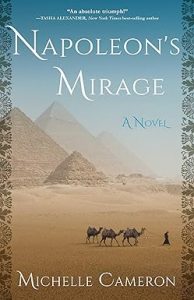Using the Senses in World Building
By Michelle Cameron
 World building in historical fiction (or, frankly, any other kind) requires the writer to pay a great deal of attention to what life was like during whatever period they’re writing about. Of course, it goes without saying that substantial research helps the writer to understand how people dressed, what they ate, how they traveled from place to place, what world events would have been talked about, and so much more.
World building in historical fiction (or, frankly, any other kind) requires the writer to pay a great deal of attention to what life was like during whatever period they’re writing about. Of course, it goes without saying that substantial research helps the writer to understand how people dressed, what they ate, how they traveled from place to place, what world events would have been talked about, and so much more.
But I like to overlay my research by using the five senses to fully immerse the reader in a particular setting. To do so, I have an exercise that I developed for the teen writing camp I teach at every summer – an exercise that I now use with my aspiring adult novelists as well. I begin by explaining that sight is the default sense used by writers when they approach a setting – but that employing at least a few of the others can bring your writing into visceral life. I then submerse my students in a meditation on a single scene, which I call Isolating the Senses.
Writers select a particular location to focus on. They stand, eyes closed, and “look” carefully at the details of the scene before them. They then turn to the right, to the back, and to the left – each time taking the time to “see” what lies in front of them and how the scene has shifted either subtly or, in the case of the 180-degree turn, entirely. After making careful notes, they remain seated and, keeping their eyes closed once more, hone in on what they can smell (and possibly taste, which is the most difficult of the senses to emulate), what they hear, and what they can touch. After each sense, they add to their notes – and finally write the scene.
My students are often amazed at how significantly more fleshed out their setting becomes due to these few minutes of sensory concentration. Many have mentioned that they use this exercise any time they get stuck picturing what their characters would experience in the past worlds they create.
You do, of course, have to have done enough research to be able to fully imagine where you would, in fact, be. There is a huge difference between the sound of cars on pavement to horse-drawn carriages on cobblestones, for instance. Or what your character feels in a constricting corset compared to the easy sway of poodle skirts.
I myself extend this technique when I can, using the various research tools I have gathered. When writing my latest published novel, Napoleon’s Mirage, I’ve been aided by the fact that Napoleon took some 160 savants – scientists, mathematicians, artists, and more – with him on his military expedition to Egypt. These savants compiled their data along with their perceptions of this once mysterious country in the French Institute of Egypt’s massive volume, a Description of Egypt. And I contrast their “fish out of water” reactions to those of the natives, due to another primary source I used, al-Jabarti’s Chronicle of Napoleon in Egypt, in which the Egyptian author described his disgust at certain French customs while marveling at their scientific innovations.
It was an age of great paintings, by both French and British artists. I’ve stared for hours at George Arnold’s The Destruction of ‘L’Orient’ at the Battle of the Nile, where the French pride of the fleet, L’Orient, was blown to bits by British gunships. The sound of explosion was reportedly so intense that it stopped both sides from fighting for a full ten minutes. While immersed in this vivid painting, one can almost feel the buffeting of the waves, especially in the small escape boats both British and French soldiers used to head toward land and safety. And one can almost imagine being overwhelmed by the smell of gunpowder, smoke, and flame as it billowed upward into the sky.
I also use personal experience in bring history to life. Napoleon forced his French soldiers to march through the desert, baking in their woolen uniforms and suffering acute thirst, not having been supplied with water before setting out. Having lived in the desert myself for a few years, I have been caught in the middle of wind storms, felt the prickling of sand pellets as they struck my face, crawled into my eyes and made their way into my mouth. Here my memory of the sense of touch in particular came into play as I placed my poor soldiers in the midst of one such storm during the perilous desert trek.
When working on my novels, I also like to cook and eat the food my characters would have enjoyed. When writing the prequel to Beyond the Ghetto Gates, I made dishes from the acclaimed Classic Italian Jewish Cooking by Edda Servi Machlin, savoring them as I employed the sense of taste. In Napoleon’s Mirage, one of my characters was a young baker who experimented with a variety of regional Italian pastries. As an avid fan of the British Baking Show, I was able to take what I learned about many of these recipes to describe his creations. And having lived in the Middle East, I was also able to imagine that the local cuisine was probably not appreciated by the French soldiers who accompanied Napoleon – at least not at first.
Many of my readers have commented that they “felt they were there” due to my use of the senses in capturing the various historical worlds I’ve created in my novels. This, of course, is the compliment any writer hopes for when worldbuilding. I feel strongly that a huge component in immersing a reader in any scene is when they imagine seeing, hearing, smelling, tasting, and touching it. So, after doing your research into whatever period you are creating, do employ your senses to fully imagine the world – and thereby bring your readers there with you.
__
Michelle Cameron is the author of Jewish historical fiction, with her most recent being Napoleon’s Mirage, the sequel to Beyond the Ghetto Gates. Previous work includes Babylon: A Novel of Jewish Captivity, a finalist in religious fiction in the 2024 Next Generation Indie Book Awards, the award-winning Beyond the Ghetto Gates and The Fruit of Her Hands: the story of Shira of Ashkenaz. Michelle is a director of The Writers Circle, a NJ-based creative writing program serving children, teens, and adults. She lives in Chatham, NJ, with her husband and has two grown sons of whom she is inordinately proud.
NAPOLEON’S MIRAGE
 Readers of Stephanie Drey and Allison Pataki will enjoy this highly anticipated sequel, an epic saga of love set during the Napoleonic invasion of Egypt that explores loyalty, cultural failures, and a potentially history-altering military defeat.
Readers of Stephanie Drey and Allison Pataki will enjoy this highly anticipated sequel, an epic saga of love set during the Napoleonic invasion of Egypt that explores loyalty, cultural failures, and a potentially history-altering military defeat.
More than a year has elapsed since the ghetto gates were destroyed and Ancona’s Jewish community liberated by Napoleon’s troops. Yet Mirelle is ostracized–by the community, her erstwhile best friend, and even her mother–and labeled a “ruined woman.” As her efforts to nurture her family’s legacy are thwarted, she realizes she might have lost her last chance at love. Meanwhile, Daniel, now a lieutenant in the French army, and Christophe, the man responsible for Mirelle’s disgrace, set sail to an unknown destination with General Bonaparte’s forces. There, Napoleon and his men face a harsh and unforgiving landscape and new, implacable enemies, and Daniel’s faith in and loyalty to the commander he once worshiped are put to the test.
Epic and rich with well-researched detail, Napoleon’s Mirage is a novel of misguided ambition leading to brutal warfare, failures of cultural appropriation, and a military defeat that just may have changed the course of history.
BUY HERE
Category: On Writing























